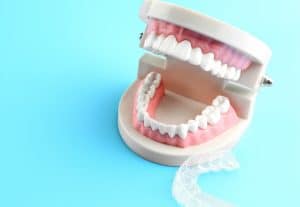 After grinding your teeth together constantly and consistently, having bruxism can become one of the biggest threats to your long-term oral health. Unfortunately, it isn’t always to tell on your own if you have a bruxism problem, or if you just occasionally grind your teeth out of habit. This can make the dangers of bruxism even more of a threat, as the longer it takes to diagnose and address it, the more damage it may cause to your teeth and oral structures.
After grinding your teeth together constantly and consistently, having bruxism can become one of the biggest threats to your long-term oral health. Unfortunately, it isn’t always to tell on your own if you have a bruxism problem, or if you just occasionally grind your teeth out of habit. This can make the dangers of bruxism even more of a threat, as the longer it takes to diagnose and address it, the more damage it may cause to your teeth and oral structures.
Why your teeth are in danger if they wear down
Bruxism is the chronic and subconscious grinding of your teeth together, and one of the more significant consequences of this grinding is the wearing down of your healthy, natural tooth structure. When this occurs, your worn teeth won’t repair themselves or regrow any of the structure that they’ve lost. This can lead to weakened teeth that can fracture or break more easily, become susceptible to chronic tooth decay, and more. The dangers of extensive tooth wear may be mitigated with customized restorative treatment, though you’ll have to address your bruxism problem to avoid damaging the restoration by grinding your teeth against it.
What your teeth go through if it continues
The wearing down of your tooth structure as your grind your teeth together can lead to a wide range of problems down the road if it isn’t addressed. More immediately, however, you may notice your teeth becoming increasingly more sensitive as their outer layer of protective tooth enamel wears down first. Growing tooth sensitivity should always be taken seriously, and if you act quickly enough to detect and treat bruxism early, you may have a good chance of avoiding more serious tooth pain, wear, and damage.
What you might do to address your bruxism
The faster you address bruxism and put a stop to your teeth-grinding, the better chance you have of preserving your healthy, natural tooth structure. Minimizing the damage to your teeth also means minimizing the extent of your overall treatment. In many cases, treating bruxism early can be accomplished with the help of a custom-designed oral appliance that protects your teeth from grinding against each other when you sleep at night. If one or more teeth have already been worn down or damaged, then you may also require personalized restorative treatment to repair them.
Learn how to avoid the dangers of bruxism
If your dentist notices signs that you have bruxism, then addressing your teeth-grinding problem as soon as possible can be essential to preserving your teeth’s health and integrity. To learn more, schedule an appointment by calling Gentle Smiles in Dallas, TX, today at 972-329-7645 (972-329-SMILE).






Recent Comments